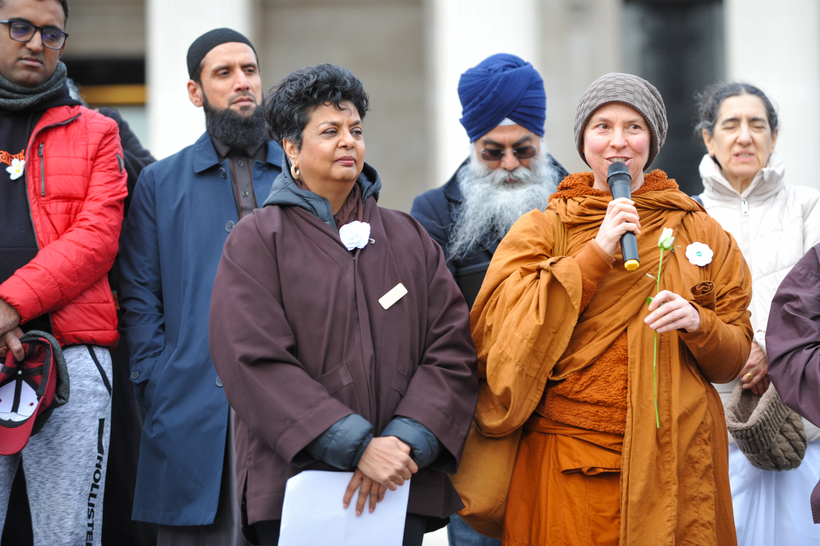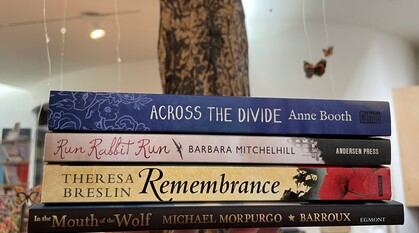Inter Faith Week: exploring early Quakers and other religions
Eleanor Nesbitt highlights some fascinating historical examples of George Fox and other Quakers' interactions with other faiths.

Next week, 9-16 November, is Inter Faith Week. Engaging with other faith communities is an important part of Quakers in Britain's work, and it's nothing new.
Did you know that in 1680 George Fox, Quakers' co-founder, wrote a letter addressed to the king of Algiers? When, in 2022, at a Friend's suggestion, I set out to write my little book Open to New Light: Quakers and Other Faiths for the Quaker Quicks series, I had an opportunity to investigate further.
Muslims and Jews
What I did already know was that, as early as 1658, a Yorkshire housemaid, Mary Fisher, had set out to Turkey to share her Quaker faith with Mohammed IV, the sultan of the Ottoman empire and that she'd been favourably impressed by the way he had received her, as compared with the flogging and imprisonment she'd experienced in England and America.
In his letter to the king of Algiers, Fox referred respectfully to the Qur'an. Why was he writing? During the 1670s Quakers' newly established executive body, the Meeting for Sufferings, had received periodic reports that captives – some of them Quakers ‒ were suffering violence, including sexual abuse. The victims had been taken prisoner by pirates off the Barbary coast of north Africa. At that time a substantial pirate fleet employed more than 7000 men.
In his letter, Fox pointed out to the king of Algiers that this ill treatment fell far short of the ethical teaching in the Qur'an. Instead of simply invoking Christian scripture, George Fox appealed to the Muslim scripture. In Fox's view, the brutality of their persecutors did not stem from a false religion but from disobeying a religion that prohibited sexual abuse.
In fact, in a letter three years earlier he had commended Muslims for their tolerance. In 1677, writing to English readers, he demanded 'Where do you read that ever the Turks forced any Christians to observe their Holy-Dayes, Fasts or Feasts?' What was more, writing to Quaker captives in Algiers in 1683, he pointed out that they were free to worship. By contrast, he reminded them, the Anglican church did not allow Quakers this freedom in England.
Interestingly, the Qur'an that Fox had read was Alexander Ross's 1649 publication, 'The Alcoran of Mahomet'. This was the first English version. However, Ross had translated it not from the original Arabic but from a French translation by André de Ryer, published in 1647. Fox's more respectful attitude contrasted with Ross's critical belittling of Islam.
At the same time, we mustn't overlook the fact that Fox did hope to bring both Muslims and Jews to what he considered to be the true (Christian) faith. In his open letter to Muslims and Jews in 1673, he had encouraged his readers to accept Jesus as the only path to salvation. Nonetheless, while his view of salvation was exclusive (unlike the more universalist approach of many liberal Quakers today), Fox's approach to Muslims, no less than to Jews, was inclusive. And this was at a time when the general view in England was that 'Turks' and 'Moores' (the words then in use for Muslims) were enemies and irredeemable infidels.
Do read more about this online in 'Some Notes on George Fox and Islam' by the Lebanese American historian Nabil I Matar.
Languages
Fox's readiness to engage with people of other faiths was coupled with a fascination for different languages – perhaps mainly because of his intention to bring true faith to as many people as possible. In his 1683 letter he encouraged the Quaker captives to learn the language of the 'the Turks and Moores' so as to 'direct them to the grace and spirit of God in them'. He himself had studied a little Arabic.
He also owned a Hebrew bible. To ensure that Jewish readers could engage with their message both he and his wife Margaret Fell had their words translated into Hebrew. David S Katz, a professor at the University of Tel Aviv, has explored Fox's relations with Jews and with the Hebrew language.
Across the Atlantic as well Fox took a sympathetic interest in Native Americans – in 1672 he spoke through an interpreter to 'Indians' in Carolina. However, William Penn, the Quaker founder of the state of Pennsylvania, made an effort to learn the language of the native Americans and, in 1682, spoke to them 'as an equal in their own language' of 'the Great Spirit who made me and you'. His encounters led him to write that 'The humble, meek, merciful, just, pious, and devout souls are everywhere of one religion.'
Other faiths
And what about early Friends and the faiths that stem from India? Although they had no contact with Buddhists, Hindus or Jains, I can imagine how much George Fox and other Quakers would have relished engaging with them too. This year's Interfaith Week comes between Sikhs' celebration of the birth of their founder, Guru Nanak, and their commemoration of the martyrdom of their ninth Guru, Tegh Bahadar, who was a contemporary of George Fox. There's a clear resonance between George Fox's insights about steeple houses and hireling priests and Guru Nanak's insistence on an interior spirituality and service of others rather than on priestly ritual.


